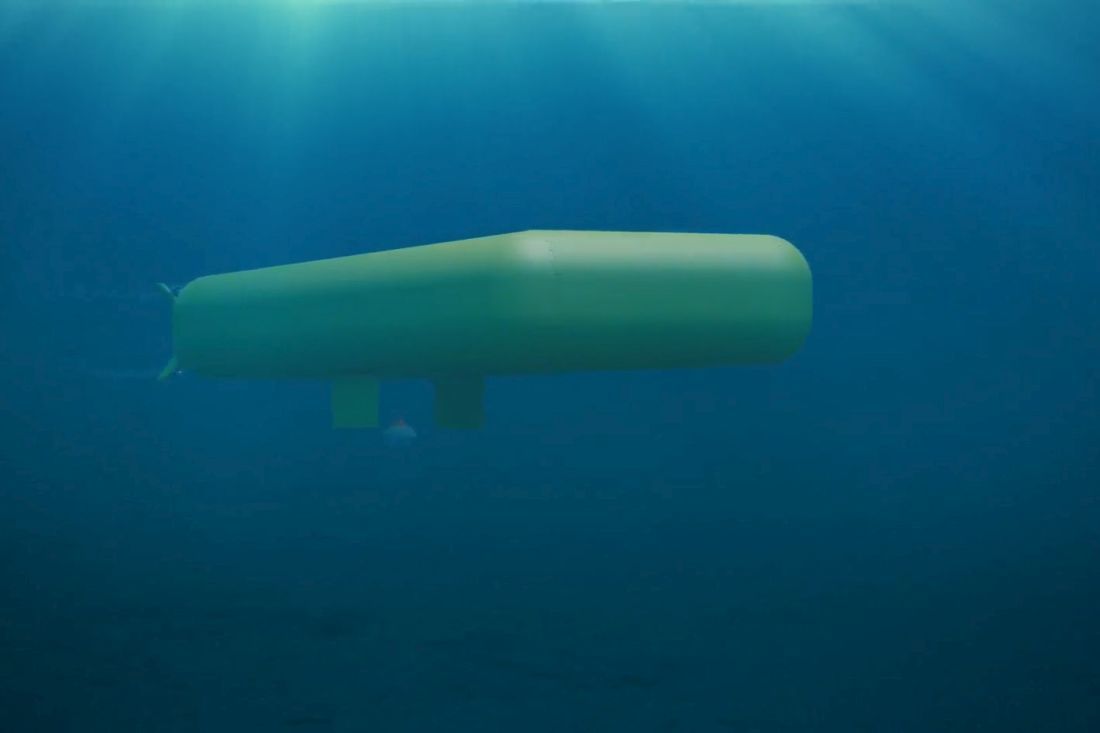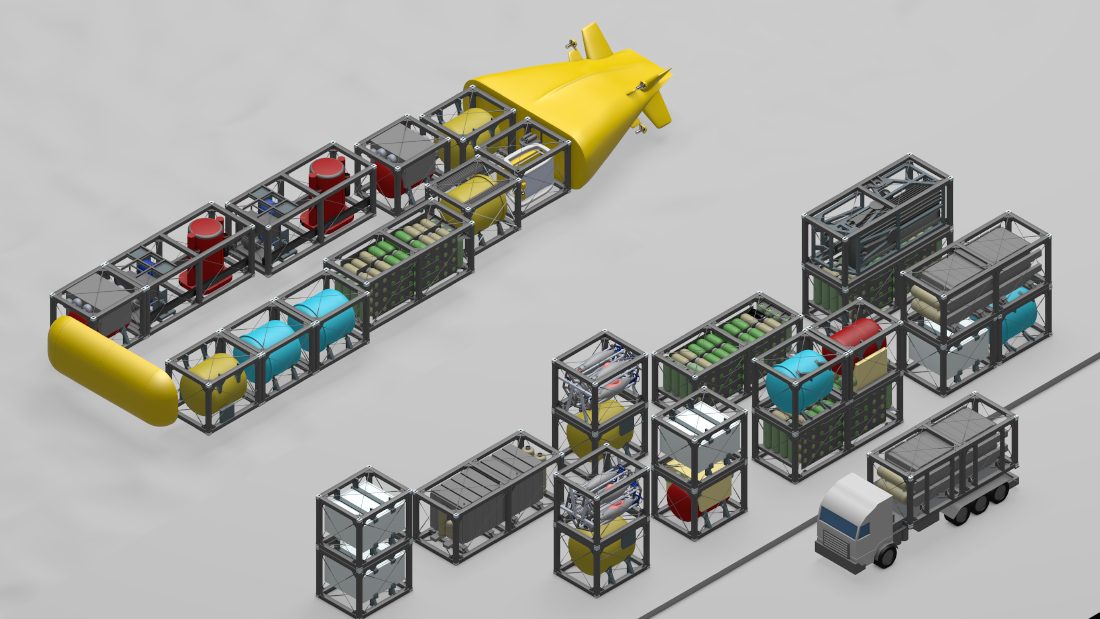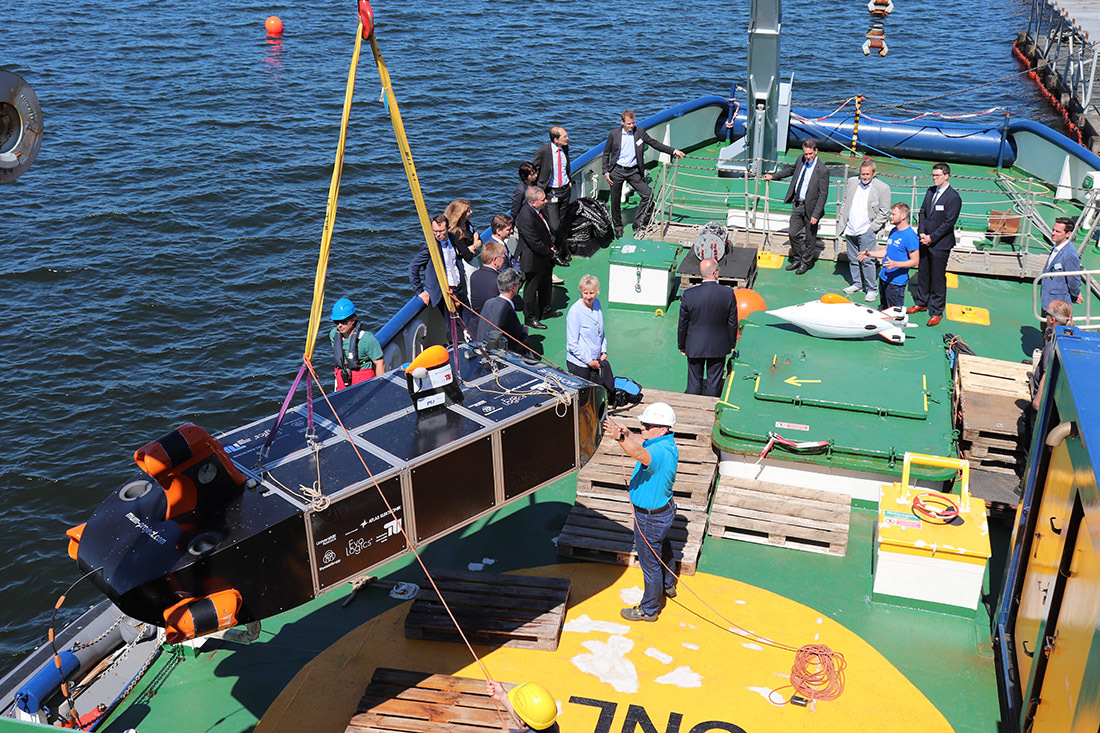Bremen plays its part in building the largest autonomous research submarine in the world
Maritime economy and logistics
MUM is an exceptional project. The maritime industry in northern Germany is breaking new ground with this autonomous civilian submarine. The vehicle has been designed to conduct research into and open up the largely unknown world beneath the ocean waves.
The figures are impressive: the battery-powered MUM (Large Modifiable Underwater Mothership) will be up to 50 metres long and capable of covering between 500 and 1,500 nautical miles (1,000 to 2,700 kilometres) autonomously, i.e. unmanned. The submarine will feature a modular construction and can be equipped with a range of systems, including batteries, sensors, transport containers and even small underwater robots, hence the ‘mothership’ in its name.
It is being built for the research and industry sectors, and will be able to autonomously carry out maintenance tasks on infrastructure such as oil rigs, deep-sea cables and wind turbines. It could also search for natural resources underwater or conduct long-term missions in the oceans for research institutes.
A large-scale project with a multimillion budget
“There is nothing comparable in the civilian sector,” says Dr Jeronimo Dzaack, Head of Technology, Innovation and Sustainability at ATLAS ELEKTRONIK. The Bremen-based company is part of a national research association working to deliver the project. Other members include Technische Universität Berlin, Rostock University, Berlin-based EvoLogics GmbH and Kiel-based thyssenkrupp Marine Systems GmbH as the project coordinator. The project is managed by Jülich Research Centre and funded by the Federal Ministry for Economic Affairs and Energy.

Many areas under development
MUM is breaking new ground in almost every aspect. One of the greatest challenges is autonomy, i.e. the ability to independently find its way around under water and carry out tasks. “The submarine’s artificial intelligence must be able to accurately identify objects in maritime traffic and comply with international rules,” Dzaack explains. This is a particular challenge as there are hardly any regulations for autonomous submarines. In this respect, lawmakers are yet to catch up with technological developments.
To ensure that the AI can find its way around, it needs accurate information about its current position. “Self-driving cars use the GPS system to navigate, for example, but the satellite signal cannot be received under water,” says Dzaack, highlighting another hurdle for the project to overcome. In addition to information about its surroundings, MUM also needs to know a lot about itself. Monitoring its systems and diagnosing and repairing faults is part of this. “The submarine might be thousands of kilometres from the nearest coast and hundreds of metres under water, so a repair crew cannot simply show up to fix any problems,” he adds.
A beacon project for the maritime industry
There are many challenges for the ATLAS ELEKTRONIK team and the project as a whole. The Bremen-based company is contributing the vehicle guidance system, methods for ensuring internal and external safety, and the sensory perception of the environment to the project, so you could say they are the hub for the system software.
Dzaack relishes the challenge: “MUM is a beacon project for the maritime industry in Germany, and from a technical perspective it would have been almost impossible to achieve ten years ago. It will allow us to expand the limits of what is possible, and naturally we will evolve as a company too.”
Conquering the oceans through artificial intelligence
The artificial intelligence on board is fed with publicly available data, project-specific surveys and simulation data. The successful integration of AI is one of the key tasks of the project.
“Organising the interaction between AI and human will be particularly interesting. The decisions made by AI can sometimes be difficult to follow, so how do you establish trust between human and machine? This is a key challenge in many areas, not just in submarines,” Dzaack explains.
Which is why verifying the AI is so important on the MUM project. When the submarine is at sea, the AI is continually confronted with new and unknown situations. How can the software developers ensure in advance that the AI reacts as correctly as possible in all situations, and provide evidence of this? “We can hardly just send the submarine out to sea and watch what happens. If it malfunctions, it could disrupt shipping traffic, or we could lose it altogether,” says Dzaack. This is one of the reasons why MUM is being developed in several phases. The initial three-year phase concluded in 2020 with the testing of a car-sized demonstrator. In the next phase, which will last from 2021 to 2024, a full-scale model will be built and tested.

Bremen excels in AI
The AI project sees ATLAS in good company in Bremen, as the Hanseatic city is evolving into a major hub for artificial intelligence. “I am excited to see so many institutes researching and developing here in Bremen. There are plenty of ‘hidden champions’ that few people have even heard of,” says Dzaack. ATLAS recently became a member of Bremen.AI, a network for the AI sector in Bremen.
“We are always on the lookout for highly qualified staff, so we need a strong science and industry scene to attract young people. I have no doubt that Bremen-based companies will grow together more closely in the coming years to achieve even more for our sector,” he adds. ATLAS too is keen to establish contact with local players.
And Dzaack himself is happy to be in Bremen. “I appreciate the fact that I can try things here that no one has ever tried before. What I find fascinating about my work is that I can see systems become intelligent, and observe how the collaboration between human and machine is improving.”
Success Stories
10 Leading Coffee Companies from Bremen
From trading to roasting to logistics – no one does coffee quite like Bremen. But who are the players driving the business in Germany’s coffee capital? Meet ten of them.
Learn moreProfile of Bremen's eight ports
Bremen's ports are the engine that drives economic activity throughout the region. But do you know which goods arrive and depart, and where? We have taken a look around the eight port complexes in Bremen.
Learn moreThe Polymath from Horn-Lehe
No can do? No such thing! GERADTS GMBH makes the things other companies can’t even imagine. This is why this engineering firm is so firmly rooted in major European aviation and aerospace projects, and also in a myriad of other sectors.
Learn more
